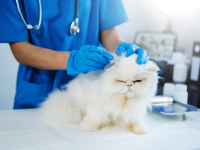Caring for a cat involves more than just providing food, water, and a cozy place to sleep. Cats are complex creatures with specific needs that, when met, can ensure they live long, healthy, and happy lives. Whether you're a new cat owner or a seasoned feline enthusiast, staying informed about the best practices in cat care is essential. This guide offers ten practical tips to help you provide the best care for your cat, from routine veterinary visits to creating a stimulating home environment.
Regular visits to Your Veterinarian
Whether a young energetic 1 year-old or a slowing down but loving senior, it is important that your cat is seen by a veterinarian on a regular basis, typically at least once a year. This allows you to form a relationship with your veterinarian and clinic team, but also for them to get to know your cat.
- Regular exams allow your veterinarian to identify potential diseases early on, such as kidney disease or diabetes, administer vaccinations, look for parasites and troubleshoot any other areas of concern you may have.
One of the most important aspects of owning a cat is understanding what is considered normal versus abnormal behavior. Your veterinarian can help you distinguish between the two and give you key watch outs, such as increased drinking and urinating.
Preparing Your Cat to See The Veterinarian
Unfortunately, one of the key reasons why owners don’t take their cat to see the veterinarian is due to the challenge or perceived difficulty of getting their cat to the clinic. This process can be stressful for the owner as well as the cat. However, like anything else, preparation, familiarity and knowledge is key.
- It starts with the cat’s carrier. Instead of leaving it in the closet and only taking it out when it's time for your cat’s appointment, leave it out in a location where you cat spends lots of time. Leaving treats, toys, soft bedding or even clothes with your scent, all create a warm friendly environment that your cat will associate with comfort and not fear.
- Because all cats and clinics are different, calling ahead of time to ask what your clinic specifically recommends or has found successful for reducing feline stress before and during appointments is also important.
Vaccinations
While adult cats are not as susceptible as kittens to certain infectious diseases, they can and still do become infected. Because of this, vaccinating adult cats on a regular basis is critically important to ensure their continual health as they age.
- Vaccines commonly offered to cats protect against many diseases and respiratory infections, including those caused by viruses and bacteria. Depending on the vaccine type, it may require a booster a few weeks later. Additionally, a rabies vaccine is often required by law due to the ability of this virus to infect people.
- Your veterinarian will work with you to identify the best vaccines that fit your cat’s needs based on its lifestyle, age and other potential risk factors.
Parasite Control
Because cats are natural hunters and curious by nature, they can be at risk from a range of parasites including fleas, ticks and intestinal worms. This is even true for indoor-only cats as many of these parasites can be carried into the home by the cat’s owner, visiting guests or even other pets (dogs, cat ferrets, etc). Cats that spend time outdoors are at even greater risk.
- Fleas are the most common parasite affecting cats as they can easily jump on cats to start an infestation. Cats become infected with intestinal worms from grooming off fleas (tapeworms), hunting small critters like mice (tapeworms, roundworms, and hookworms) or from ingesting contaminated soil (roundworms and hookworms).
- Your veterinarian will be able to assess your cat’s parasite risk factors based on many factors including environment, lifestyle and age and work with you to set up a parasite control program.
Zoonotic Diseases
While rare, it is important to understand that some diseases or parasites that cats may be carrying can inadvertently be passed to you. This is called a zoonotic disease or infection. Some common examples include bartonellosis (cat scratch fever), toxoplasmosis, rabies and GI worm infection.
There are many actions that cat owners can take to protect themselves:
- Keep your cat up to date on vaccinations, especially rabies vaccine
- Use flea and tick control; fleas can carry bartonella bacteria and tapeworms
- Ensure your cat is dewormed on a regular basis
- Clean the litter box out weekly with soap and water and wash hands when handling feces
- Pregnant women should never clean a litter box
- Wash hands or other area with soap and water if inadvertently bitten or scratched immediately
- Keep your cat’s nails trimmed
Make it a point to talk to your veterinarian about other protective measures depending on your own personal situation (family, home environment, etc.)
Feeding and Hydration
While feeding your cat and making sure they have water may seem like a rather straightforward process, there are many unique aspects about each that cat owners need to be aware of to ensure the health and wellness of their cat.
- Feeding: Because pet cats are carnivorous hunters like their ancestors, it is important that their feeding behavior match their predatory instincts. This includes using food puzzles and other games that mimic hunting behavior to feed them. It also helps ward off obesity and boredom by increasing exercise and stimulation. Your veterinarian can help you identify the appropriate food type and daily amount to meet your cat’s needs.
- Hydration: Cats have highly functioning kidneys, meaning they are able to concentrate their urine extremely well. While this may seem good, it can actually cause undue stress on their kidneys and make them prone to dehydration. Because of this it is important to make sure cats always have access to fresh water. Cat fountains can be a good option as many cats prefer fresh running water.
Dental Care
While not often known, cats can suffer from dental disease and mouth pain just like their owners. And many times, it can go completely unnoticed because cats are experts at hiding disease and discomfort as well as being unwilling to allow owners to look into their mouths.
- Common signs include bad breath, unwillingness to eat (anorexia), weight loss, and excessive drooling.
- Seeing your veterinarian at least once a year allows them to perform an oral exam on your cat’s mouth where they can inspect the teeth and gums to head off any trouble. They may recommend teeth cleaning or other dental interventions, such as a special type of food or treats to help combat plaque buildup.
Urinary Behavior And Litter Box Care
A common reason cats are put up for adoption, abandoned or taken to the veterinarian is due to improper urinary behavior, such as peeing outside of the litter box on carpet or furniture. Because of this, it is paramount you work with your veterinarian to understand what is considered normal versus abnormal bathroom behavior as many feline diseases, from arthritis to endocrine disorders, can affect how cats go to the bathroom.
Litter Box Tips:
- Cats prefer big litter boxes; aim for one that is at least 1.5x their length from head to tail.
- Place litter boxes in quiet, low traffic locations away from their food and water.
- Keep the litter box clean: scoop twice daily and wash/refill weekly.
- Most cats prefer litter that has a sand-like texture and clumps allowing them to dig around.
- Depending on how many cats are in the house, you may need more litter boxes. The general rule is one litter box per cat, plus one.
- Environmental Needs
Contrary to popular belief, cats need stimulation and enrichment in their home environment. Not only can this prevent obesity, boredom and other disease, but allows cats to exercise their natural instincts to hunt.
- Aim for several short duration play sessions each day to channel their predatory instincts. There are many interactive toys that can achieve this, including lasers, wands, and food puzzles. It’s also important to rotate the toys and play-type activities to keep things fresh and stimulating.
- Scratching is also an important behavior that cannot be avoided. It allows cats to not only scratch out, mark their territory and exercise, but also maintain their claws. Cats should be encouraged to scratch a post by rewarding them with treats and placing it in an area they spent time in and feel comfortable.
Protection from Household Dangers
Cats are highly curious by nature and tend to sample anything and everything with their mouths. It is important to be aware of plants, food and other everyday household items that can put cats in danger.
- Plants: Many plants are dangerous to cats, including lilies and aloe.
- Food: Many foods are dangerous to cats as well, including onions, garlic, raisins and chocolate.
- Household dangers: Cleaning supplies, electric cords, needles and thread as well as any small items that a cat could swallow need to be accounted for.
Cats can also be highly sensitive to certain air fresheners, scented candles as well as potpourri.
Caring for a cat is a rewarding experience, but it comes with its challenges. By staying proactive and informed, you can ensure your cat remains healthy and content. Regular veterinary care, proper nutrition, mental stimulation, and a safe home environment are all key components of responsible cat ownership. Remember, each cat is unique, so it's important to tailor these tips to fit your cat's individual needs. With the right care and attention, you'll be able to enjoy many years of companionship with your feline friend.
Elanco (or its affiliates). 10 Tips for Caring for a Cat. 2022. Pamphlet.

 Call Us Today 864-901-3189
Call Us Today 864-901-3189
